In the early days of the century, as movies like Almost Famous and The Banger Sisters shamelessly counterfeited some of the more juicy episodes from Pamela De Barres’s life, she put the finishing touches to a screenplay based on her diary-led, bestselling memoir I’m With The Band. We spoke with her about her life, and the musicians in it.
In casual defiance of the fact that her 55th birthday looms large, the Marchioness Des Barres positively radiates rude good health and an undeniably disarming beauty that is disconcertingly childlike. With her lush mane of fiery, shoulder-length curls, a porcelain complexion that belies her Sunset Striphopping, Valley Girl salad days, a pair of intimidating, ice-cool, emotion-veiling Lolita shades, a ready laugh – infectious in its rolling filthiness – and a decidedly elfin prettiness that is irresistibly reminiscent of the nascent Shirley MacLaine, she is clearly a woman who is still way more than capable of turning heads. And, once upon a time, she turned some of the most famous and iconic heads in rock history.
Of course, those days were long before she picked up her title – a fortuitous by-product of tying the knot with former Silverhead, Detective and Power Station vocalist (Marquis) Michael Des Barres in 1977 – when she was plain old Pamela Miller from California’s San Fernando Valley. Pamela loved rock’n’roll from the very first moment that she espied the hip-thrusting antics of Elvis Presley. But simply buying the records of her favourite artists was nowhere near enough.
Young Pamela wanted to show her appreciation in a far more direct fashion, and in so doing she became the most famous groupie in rock history, enjoying mutually pleasurable liaisons with (among others) Jim Morrison, Mick Jagger, Jimi Hendrix, Jimmy Page, Keith Moon, Gram Parsons, Chris Hillman, Waylon Jennings and even Miami Vicestar Don Johnson.
But there was always far more to Pamela than her penchant for the horizontal polka. She was one of the founding members of Girls Together Outrageously, better known as the GTOs, the world’s first all-girl rock band. Encouraged into being by Frank Zappa, the GTOs released the unique and astonishing Permanent Damage album (which includes guest appearances by Rod Stewart, Jeff Beck, Nicky Hopkins and Captain Beefheart) in January ’69, before splitting up a month later.
During an acting career that commenced with Frank Zappa’s 200 Motels (1971) and concluded with Sly Stallone’s Paradise Alley (’78), Pamela spent two years as nanny to Zappa’s children, Dweezil and Moon Unit. But the roles that have earned her the most critical plaudits are as the eyebrow-raising autobiographer of I’m With The Band: Confessions Of A Groupie (’87) and Take Another Little Piece Of My Heart: A Groupie Grows Up (’92), and as the unflinching chronicler of some of rock’n’roll’s most toe-curling episodes in Rock Bottom: Dark Moments In Music Babylon (’96).

What originally seduced you into the rock’n’roll lifestyle?
Elvis. I was eight years old and saw him on Ed Sullivan, and that was all it took. The voice, the face, the hips… it was the whole package. No one had ever seen the sort of stuff he was doing before except for in the black community. So he was bringing all those sexy black elements into a white world that desperately needed it. And I just took it from there. It was a natural progression from him into the pop world. Dion was my hero, then The Beatles, so it was just a natural chain of events.
Why did you eventually choose the Rolling Stones over The Beatles?
Sex. John Lennon had a bit of sexiness to him, but I was more of a Paul girl. So it was such an easy move into the Mick Jagger thing. It was that sexy, sexy stuff on their first and second albums. The sexiest stuff they ever did was on those: ‘I’m a king bee… let me come inside’, and that was something that nobody was saying then, except for maybe the black people, but I hadn’t heard them yet. I’m sure they were in the rhythm and blues world, but that was the first time I had heard anything like that.”
What was the appeal of all of these gawky English boys?
I think it just had a lot to do with the timing. It was perfect timing. I was just such a music lover, so anybody whose music moved me or got me excited and aroused I was interested in.
I just said ‘Okay’ when I saw the Meet The Beatles album cover, because it seemed like something that wasn’t so far-fetched. I guess a lot of people thought that perhaps they were so far removed that you would never be able to make their acquaintance. But I sure did. I knew they were living, breathing people.
I think a lot of it had to do with the fact that there was this band that rehearsed across the street from my house in the Valley. So I thought, ‘Mick Jagger must be standing around somewhere.’ It never seemed that impossible to me.
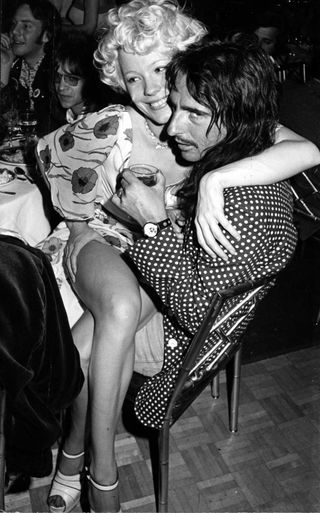
All things considered, you retained your virginity for an almost unbelievable length of time. How did you manage that?
Well, I wanted to save it for love, so I found other ways to show my appreciation. You know, the obvious way…
A firm handshake?
No, I gave head to everybody, because I wanted to be in love before I gave somebody my virginity. Most girls seemed to want to get it over with, but I never felt like that, I wanted to wait for the right person. In the end it was the wrong person [Nick St. Nicholas of Steppenwolf], but we’re still good friends. It was always important to me to stay friends with as many of my lovers as I could.
Why was it that you had to get so, shall we say, hands-on with your favourite musicians?
Part of it was showing appreciation for how good they made me feel with their music, and part of it was just lust. They were the most attractive people to me. And I was pretty cute myself.
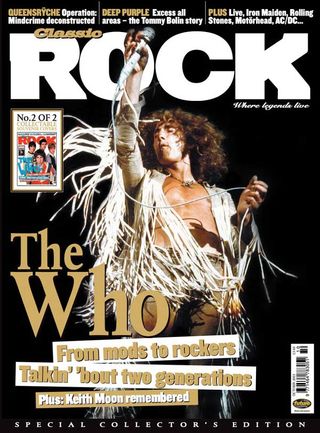
It comes across quite strongly in I’m With The Band… that these things just seemed to happen to you: right place, right time, catch the right eye, wallop.
There was never really any secret to it. The whole thing was very equal. There weren’t a whole lot of girls at that time trying to do what I was doing. Eventually you did get more girls trying to get backstage and all that, which made it more difficult, but by then I wanted to settle down. So it was perfect timing.
Did you fall in love with all of them, because you do come across as a complete romantic?
Well, yes, but I was a hopeful romantic. I thought I was in love with all of them. I wasn’t in love with Mick Jagger or Keith Moon or Waylon Jennings, those were flings – even then I knew they were flings. But Jimmy Page I fell in love with, and Chris Hillman was my first true love, and I wanted to wind up with one of these people. I wanted to spend my life with one of them.
I was such a rose-coloured-glasses-wearing young girl and I really thought that could happen. And it did for a while. I married Michael Des Barres and we had a really wonderful marriage for quite a while. I consider our marriage a success in that it lasted so long. He’s like my brother now, one of my best friends.
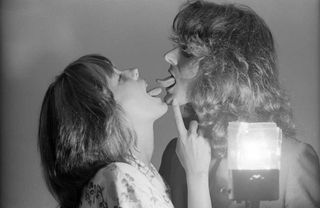
Did you get your heart broken?
All the time. Jimmy Page broke my heart pretty bad, Chris Hillman too. And Don Johnson broke my heart, I was really in love with him.
You were very nearly Mrs Jimmy Page, were you not?
Well, that’s what he said, but that’s not true. I found out later that there were two other girls that he said the same stuff to. He had this special way of kissing you where he would kind of spit in your mouth. It doesn’t sound good but it was very romantic. He was like branding you; it was kind of like a dog pissing on a hydrant. He was like making you his. And he was a wild lover.
He was a really amazing, proficient person at that particular thing. I was so jealous when he got married, because he was my beau when they met – on his birthday, yet – and I was devastated. He’d sent me this amazing, stunning necklace for Christmas and I thought I was just in, and then two weeks later he meets the love of his life. I was so upset.
Be honest, did you score your conquests on performance or, dare I say, length?
No, I never talk about that. I wouldn’t say one person’s better than another person, it just wasn’t like that. I wasn’t after them to put any notch on any gun-belt or anything like that, I was really looking for love, so the people I loved the most were the best in bed. The old in-and-out isn’t that great without love.
You must have seen a lot of groupies come and go.
So to speak.
Especially in the mid-70s, when the whole game became far more competitive. But, ultimately, who was using whom?
When I saw the really young girls coming into it who didn’t really care about music and it was all about the notch on the bedpost, I realised that my time in that world was up. I found other ways to stay in the world of music. I didn’t want to be in that world anymore. They were starting to use each other at that point. But when I was seeing bands, with the GTOs and in the Zappa world, no one was using anybody, it was all equal.
How did the GTOs come about?
We were just a bunch of girls who met on the Strip. We met this guy called Vito, who was a mad kind of Pied Piper who had a house where a lot of people gathered. He taught dance and sculpture. A lot of us met there and started hanging out in a pack. Someone there worked for Frank Zappa as Moon’s governess, so we started hanging out at the Zappa house. He saw some of his version of commercial potential in us and suggested we start writing songs. And we were thrilled. All of a sudden we became a group – and we had groupies.
As far as right time right place goes, the old magic was working once again: you’re in the Zappa studio, recording some tunes, and suddenly Jeff Beck happens by, Rod Stewart pops round and, hey presto, they’re on your album.
Well, they were all our friends, people that we hung out with, and a lot of them we weren’t sleeping with. Jeff, Rod, the whole Jeff Beck Group were there, the Mothers, Lowell George co-produced. We were all just friends. We were in that world, and they wanted to be on the record. We didn’t have to talk them into it or anything.
Was Zappa something of a father figure to you?
Well he wasn’t that much older than I was, but he was always very wise and mysterious, and whenever I was around him I was nervous. No matter how many years I knew him, he always made you feel a little intimidated, like he was scrutinising you – and I’m sure he was. So he wasn’t really a father figure, more of a mentor and kind of an idol, really. Even though I wound up living in the house for years, I still felt that way. It was all his vision. He saw us as a group, and that’s how the GTOs came about.
We’ve established that you attracted groupies of your own as a member of the GTOs, but did you find aspiring musicians pestering you for sex just for the kudos of bedding Miss Pamela, like proper rock stars?
There was one guy, who shall remain nameless, who said one time after we made love: “I got in there so deep I think I saw Jimmy Page.” But it was great. It was out of reverence, there was nothing nasty intended. He just liked to be in the same place where those people had been. And you know what? I didn’t mind.
He wanted to play the same venue, as it were.
Dave Navarro, who I had a little thing with, wrote a book – that didn’t come out because a lot of people got annoyed that he was telling tales on them – and he said something like that in there. But we never consummated our thing, so that upset me because it wasn’t true. But he thought the same way. His heroes had been around me, and if that’s why he wanted to hang out with me, fine. I had a good time with him.
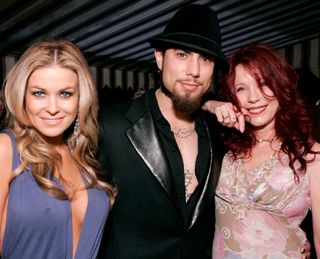
Were people offended when you snubbed them?
I didn’t snub anybody, I don’t think. I’m not a big snubber. But I didn’t just jump in bed with anybody that was hot for me, I had to really care about them. But yeah, I had the groupies following me around, but they were mainly girls who wanted to be around me and the GTOs because we knew the right people.
You were also ahead of your time in being an empowering, ballsy, all-girl rock’n’roll band before the concept had even been considered elsewhere.
Yeah, our girl group was the first of its kind, and that’s why Frank is such a great innovator for bringing us together. And of course we jumped on it. To do our own record in 1969 was really amazing. And we were in the centrefold of Rolling Stone, which was huge.
Are there any current musicians who catch your eye? Do any of them cut the same dash as the Morrisons, Pages, Jaggers or Stewarts used to?
No, none of them are quite that dashing. Because those guys came first, they were the pioneers, and so rarely can they be matched. But there are bands that I really like. I’ve got to say Audioslave, because I’m a Chris Cornell slave. And, sure, the hot guys still get me hot. I haven’t met Chris yet, and it’s unusual that I don’t get to be friends with my heroes – at least.
Why did you decide to write I’m With The Band…?
Because I kept diaries, and I knew they were important when I was writing them because of the amazing life I was living, and I knew the music would be revered forever. I just knew it. And now The Doors and Hendrix sell more than they ever did then. And how about Zeppelin – straight to number one in America with a three-CD set?
I always figured I’d fall back on writing. It was just the right time to write it. I was 33, and Steven Davis, who wrote Hammer Of The Gods, interviewed me and said: “You shouldn’t even be telling me this stuff, you should write your own book.” So that really encouraged me.
Did you leave anything out to spare people’s blushes?
I only left things out that would hurt somebody, I’m not into hurting people. But there is one passage that in the end I did leave in and I do regret that, because I know Jimmy Page got upset about it. It was the scene where I wasn’t seeing him anymore, but we were friends and I was visiting him, and he was crawling across the floor to get the bag of drugs. He didn’t like that, even though it was so true. But I did leave a lot of other stuff out. I think we’ve made up now, last time we talked he was fine.
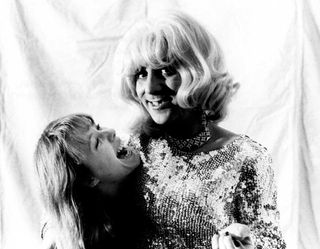
Too many of the people who you talk about in I’m With The Band… are no longer with us: Keith Moon, Jim Morrison, Frank Zappa, Jimi Hendrix, Gram Parsons and, most recently, Noel Redding.
I know. I was heartbroken. I stayed in touch with Noel all the way. I saw him just five months ago. He was in town doing a Hendrix birthday tribute, and it was so great to see him and we just kind of hung on to each other – he clung on to me for dear life, actually. I was all: ‘Oh, Noel doesn’t seem too well,’ but I knew that his mother had died shortly before and that was very tough on him because they were very close.
Living the high life doesn’t seem to have done you much harm. You’re looking as fit as a fiddle.
I know, isn’t it great? I must have good genes, I guess. But I eat well, and I’ve never been addicted to anything. I’ve certainly had my stages of being as high as a kite, but I’m not addictive so it didn’t stick. I could go ages without doing it, you know. But I wouldn’t trade my acid trips for anything.
Were there many wives who wanted to scratch your eyes out?
I never went with married men. Other than Waylon Jennings, and I didn’t know he was married – and he certainly wasn’t about to tell me.
Surely Bianca Jagger was more than a little adamant that you stop phoning Mick after they were married, wasn’t she?
Yeah, but I didn’t know about her. I was in Europe, and when I came back I called Mick to get back together with him and she answered the phone. And of course I didn’t bother him after that.
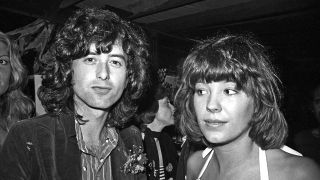
Would you recommend the groupie lifestyle to a young lady in search of career guidance today?
It’s not there anymore. You can’t have that kind of lifestyle. Now, I always say just get in the business. If you are desperately in love with musicians, just become a photographer, be a DJ, work at a record company, start your own band or do what you do.
Do you ever regret ones that you missed – Jim Morrison for example?
I made out with him, that’s almost as good. I was a virgin then and he was a gentleman about it, he didn’t force it. He was so sweet; he was a mess when he got fucked up. But this was around the time of the first album, so he was the most beautiful person next to Elvis that I had ever seen – to this day. Looking up at his face and knowing he was about to kiss you was pretty great.
So, no regrets?
The only regrets I have are things that I didn’t do. One, could I have gone to see Elvis that night, and the other that I could have fucked Jimi Hendrix but I was just too shy and I was a virgin and I just couldn’t do it. It would have been cool if he had been the first, and he could have been, so I have a slight regret about that. I went off with Noel instead. I was the ‘Foxy Lady’, you know, at 17. How great is that?
Pamela Des Barres is hosting writing workshops in December and January - full details are on her website. This interview originally appeared in Classic Rock 58, published in October 2003.


